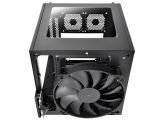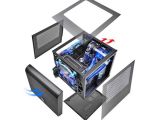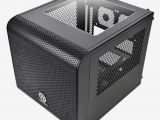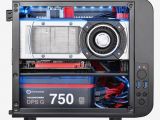There was a time when miniature enclosures were the exclusive staple of low-power, low-performance computers, but this has not been the case for years. It's gotten to the point where it is perfectly possible to house a gaming system in a case like Thermaltake's new Core V1.
There is, in fact, an entire sub-culture of mini gaming PCs, many of which land in the hands of people who like to attend LAN parties. You know, gatherings of people who conduct joint, co-op, or competing gaming sessions of whatever title they prefer at the time.
Sometimes, things stretch beyond LAN parties to international matches held over the Internet. It's the whole reason why so many real-time strategy and MOBA (multiplayer online battle arena) games exist.
Still, not all mini PC cases can hold a powerful enough PC, and even fewer of them are aesthetically endowed enough for the part.
The new one that Thermaltake has just released is not particularly embellished, but it does have everything else of note. More, even. After all, it has a split interior, with a horizontal motherboard tray on which to place the mainboard and all the other PC hardware you may need.
There are removable drive device racks in the upper chamber as well, for 2.5-inch and 3.5-inch HDDs (hard disk drives) and SSDs (solid state drives).
That said, the lower chamber holds the power supply unit (full-size, powerful ones supported), with the rest of the space left for all the cables.
All the while, heat is kept at a minimum thanks to whatever DIY/AIO liquid cooling system or air cooling unit you choose to install, although there is a 200 mm fan pre-installed on the front, plus the option of two 80 mm ones at the back.
Other perks include a removable dust filter on the PSU chamber, shockproof rubbers built into the bottom of the case (also to prolong PSU usage), and dual USB 3.0 and HD audio connectors (part of the same front panel as the Power/Reset button).
Sadly, Thermaltake did not share the pricing and sales details of the Core V1 case, even though the product page is up and running. Kind of a shame, since those details would have told would-be buyers if their current finances allowed them to buy it and all the custom overclocking-related hardware they're thinking about, or if they needed to save up more. It could go either way really.
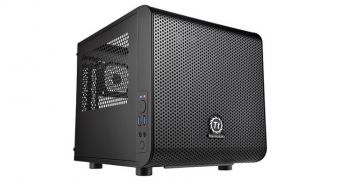
 14 DAY TRIAL //
14 DAY TRIAL // 
